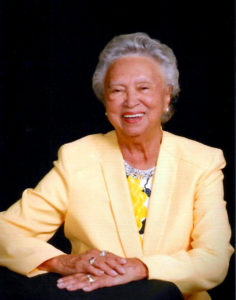 September is National Healthy Aging Month, which can be the perfect time to reflect on one’s personal health and wellness goals and create strategies for healthy living in later life. For this National Healthy Aging Month, I had the pleasure of sitting down with Mrs. Valma Veronica Metoyer to discuss her thoughts about healthy aging and a few other topics of interest.
September is National Healthy Aging Month, which can be the perfect time to reflect on one’s personal health and wellness goals and create strategies for healthy living in later life. For this National Healthy Aging Month, I had the pleasure of sitting down with Mrs. Valma Veronica Metoyer to discuss her thoughts about healthy aging and a few other topics of interest.
Mrs. Metoyer is the cookbook author of Qu’est~Ce Qu’on Va Manger: A Culinary Journey. She was married to her late husband, Joseph Phanor Metoyer, Sr. for more than 63 years before his passing. Together they raised eight children, and today Mrs. Metoyer has 30 grandchildren, 54 great-grandchildren, and two great-great-grandchildren. When her beloved husband began to experience health problems in later life, Mrs. Metoyer served as his primary family caregiver, and it was through that experience that she became deeply interested in the issues of family caregiving and elder abuse, two issues that we both believe are often overlooked when it comes to conversations about healthy aging in older adults.
Over the years, Mrs. Metoyer has become very near and dear to my heart. She was a participant in one of the West Coast focus groups for my documentary film, You Look a Lot Like Me, and since that time I had the privilege of documenting her life story in the legacy film Coupleness. Most recently, I asked Mrs. Metoyer to be one of the advance readers for my new coloring book journal for family caregivers of adults, Led By Love. Her input, and that of her daughter, Marie Crumsey, and her son, Louis H. Metoyer, was invaluable to me.
I’m so pleased to share some of Mrs. Metoyer’s words and wisdom here. Don’t forget to try the baked salmon recipe she was kind enough to share! It’s delicious!
—
CM: You are a beautiful and vibrant eighty-eight years young. You must know a thing or two about healthy aging. Can you share some of your secrets for living a healthy life?
VM: I know it may sound simple, but I think a healthy breakfast is very important for a long and healthy life. My breakfast is usually a bowl of oatmeal and fruit. I have always tried to exercise, by taking a walk or going to the gym. While I enjoy and miss them, I don’t eat a lot of red meat or pork, and I eat a lot of vegetables and whole grain bread. Those are my preferences, but you just need to find what works for you.
I really do not have a secret for staying healthy. I think you just have to live life in as good a way as you can. I think looking at things in a positive way and addressing problems when they arise, rather than waiting, are good things to do. It’s incredibly important to have support as well, whether from family or friends. For me, family is the most important thing. My happiest times are those spent with my family. And for me, God has to be present in every minute of my day. That comes before anything else. I believe that, in life, you have to have a commitment to something bigger than yourself. For me, that “something” has always been God. Other than those things, I guess I’d say go easy on the sugar (who wants to hear that?!), and just move a lot, love a lot, and laugh a lot! It really is the best medicine.
CM: We were honored to have your participation in one of the focus groups for You Look a Lot Like Me. What, if anything, did you take away from that experience?
VM: It was my pleasure to participate. I learned a great deal from the experience. It was quite an eye-opener for me. One of the most important things I learned is that, sadly, there are so many people—women and men—who are living in situations and relationships where they are being abused every day, as well as children, who often have no choice or say in the matter.
CM: What were some things you believed about domestic violence before taking part in the focus group or seeing the film? Do you see things differently after your participation and watching the film?
VM: I had always believed that if a person stayed in a relationship where they were being abused, then it was their choice. After taking part in the focus group and seeing the film, I realize that the person being abused—and in many cases their children—is not necessarily in any position to leave the person who is abusing them, or maybe the person being abused may not know what steps to take in order to leave safely. Also, if their partner has promised not to hurt them again, they might truly hope and believe in their heart that things will be different, and that the abuse won’t happen again. That’s understandable. And in some cases, if the person being abused came from a childhood where they witnessed abuse or were the victim of abuse, they might also see that behavior as normal. I now recognize that these are often very difficult and complicated situations. They are not as clear-cut and straightforward as I once believed.
CM: During our focus group, you shared that you are deeply concerned about elder abuse, and I know you are committed to helping to raise awareness of the issue. Why is elder abuse something you feel so strongly about?
VM: I feel very strongly about elder abuse and neglect because I have witnessed it on many occasions, both in families and in hospitals and nursing homes. At times, I witnessed staff members mistreating patients. I also saw family members acting in ways that were inappropriate and abusive. Most often, I witnessed elder abuse in the form of neglect or in being preyed upon financially, but abuse comes in so many forms, including physical and emotional abuse. I have also heard of seniors being abused sexually. And, as I mentioned, I have definitely seen a lot of elder neglect and abandonment. In some cases, the neglect might have been unintentional, or due to a lack of awareness, but, in the end, the person was still being neglected. One example of this would be that I have known seniors whose adult children are happy to be around them when they are “healthy” and doing well on their own, but once they become ill or are in need of more frequent care, their children suddenly visit less and less or don’t contact them on a regular basis to see how they are doing. This can be very isolating for the older adult and I think that isolation and loneliness has a negative effect on healthy aging.
CM: What is your earliest memory of recognizing what we would now consider elder abuse or domestic violence in later life?
VM: I don’t really remember seeing what I would call elder abuse in my earlier years. I grew up in a very different time. It was not at all like today. I am sure there were families where elder abuse was taking place behind closed doors, but I can’t say that I ever recall anything that resembled it back then. It wasn’t until I was much older.
CM: Why do you think an older adult might be vulnerable to abuse or neglect?
VM: If the older adult has care needs, no matter what those needs may be, that might be one reason. I think another factor may be that many older adults are lonely and will tolerate a great deal in order to have someone with them who will take care of them. If you are in need of care, and that family member, caregiver, or facility is all that you know or have, then you might settle for it, even if you know that it isn’t necessarily good for you. Another reason could be a person’s financial situation, or some combination of all three of those things.
CM: Do you feel that you have received enough education or training as an older adult about what elder abuse is, how to recognize it, and what to do to report abuse, either for yourself or for a loved one?
VM: Thankfully, yes. I now feel confident that I would recognize if anyone were abusing me or one of my loved ones, and also what to do about it. But I do think that we could do a better job, as a society, of educating all older adults and their caregivers about the different forms and warning signs of elder abuse.
CM: What are some of the changes you would most like to see happen around elder abuse and domestic violence in later life?
VM: I would like to see more older adults treated with love and respect, both from their families and from our society.
CM: Some of your thoughts on elder abuse are featured in the Movie Companion Book for You Look a Lot Like Me. What was that experience like for you, sharing those thoughts with our readers?
VM: I very much enjoyed taking part in the Movie Companion Book for You Look a Lot Like Me. I am so glad to know that there is help for people who are being abused, and through the experience of the focus group, watching the film, and contributing to the Companion Book, I learned that there is a lot of help available, and a lot of hope. I hope that the thoughts I shared about elder abuse and neglect might help someone one day.
CM: As an older adult, how do you feel about advance care planning?
VM: I believe that advance care planning, and planning in general, is very important. As older adults, I feel that we need to plan for our future care long before we become “seniors.” For example, it might be good to talk to your doctor about your wishes. Another suggestion might be to talk to the person or people you feel might be in the best position to assist you should you require care. That would give you the chance to discuss your feelings about needing care and ask about their feelings and concerns about possibly becoming your caregiver. You might also consider checking on the local resources available to older adults in your area. I would also suggest getting your wishes down on paper. Getting things in writing has helped me a lot. I am thankful that my late husband and I had the time to talk about his final wishes. That allowed me the opportunity to convey those wishes to our children. If you know what you want, and everyone is clear on expectations, I think that is a good thing.
CM: You were married for more than sixty years. What would you say are some of the secrets to a healthy and loving long-term partnership?
VM: I think communication is the most important thing when it comes to having a healthy and loving long-term partnership. A long-term relationship takes a lot of patience and understanding. You have to be willing to listen to your partner and be willing to talk about any situation that may arise. You also have to give and take willingly at different times, about different things. A long-term partnership is like anything in life you love—you have to take care of it.
CM: At some point, you became a caregiver for your husband. What were some of the challenges you faced as a family caregiver?
VM: I am gratef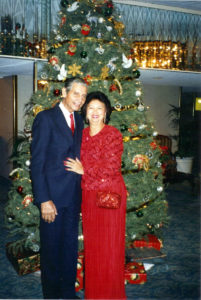 ul that I was in a position to take care of my late husband when he needed my care. I was happy to do it, and I would gladly do it all over again. There were challenges, of course, but thank God, my children and I had prepared for many of those challenges in advance, which made things a lot easier for all of us. As a family, we had, on many occasions, talked about how we were going to manage the situation, as we could see my husband’s health deteriorating over time.
ul that I was in a position to take care of my late husband when he needed my care. I was happy to do it, and I would gladly do it all over again. There were challenges, of course, but thank God, my children and I had prepared for many of those challenges in advance, which made things a lot easier for all of us. As a family, we had, on many occasions, talked about how we were going to manage the situation, as we could see my husband’s health deteriorating over time.
I have to say that my husband was a good patient, and I was fortunate in that he was able to understand what was going on, both with him, and around him. He never demanded anything and was always appreciative. The most unforeseen change for me was when he had to be in the hospital and I had to come home alone at night. That was probably the most stressful part of the entire experience for me.
I was blessed to have a lot of support from my children, especially my son Louis and my daughter Marie. Louis would go to the hospital to feed his father on some nights, and my other son Fredrick went in his place when Louis couldn’t go. When he was still at home, sometimes my son Ronald would come and take his father out for walks, while my husband was still feeling good enough to do that. My daughter Marie would come out to our home every weekend to give me a break, and she and I would go shopping, or out to lunch together. Getting out was so good for me, because I had a real opportunity every week to just relax for a few hours and not worry about my husband or our situation, but I was only able to do this because I knew he was in good hands while I was away from him. Not every family has that assurance or support, and I realize how lucky I was.
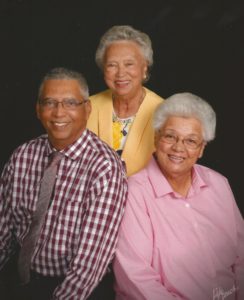
CM: What advice would you give to someone who is a caregiver for an older adult?
VM: The most important piece of advice I would give to any caregiver is to take care of yourself first, and be sure to take breaks often, and do things for yourself that you enjoy doing.
CM: You were one of the advance readers for my new coloring book journal Led By Love. What did you think of the book?
VM: As someone who was a family caregiver not only for my late husband, but also for my late mother, I think that your coloring book journal Led By Love is a great and relaxing book for caregivers. It helps get your mind off of some of the difficult challenges and emotions that you may be dealing with as a caregiver. It creates an opportunity to spend some creative time with your loved one. If your loved one is able, I would suggest coloring together. That might be something you both really enjoy, even if you color outside of the lines! If the person receiving your care is not able to color with you, then you can use the journal as a way to spend some quiet time just for yourself. You may even get to see or feel things differently after working in the book. I think it is very important to set aside time for yourself when you are a caregiver. You need that for your own survival.
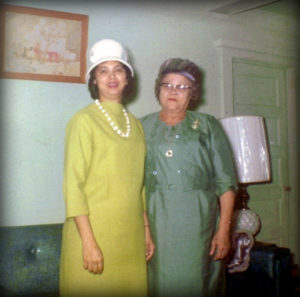
CM: I know you also have a book out, a cookbook featuring your own unique family recipes, many of which provide your personal take on the Creole classics of your childhood growing up on Cane River in Louisiana. What was it like working on that project and what was your inspiration for creating the book?
VM: I do have a cookbook that I enjoyed putting together with my family. I have always enjoyed cooking, and my husband and the children always seemed to enjoy everything I cooked, so I decided to share my recipes with others. I learned so many recipes from my mother. She was my motivation for trying to cook more healthfully. My mother was a diabetic, and because of that, I learned to cook without salt or sugar in a lot of my recipes. Some of those recipes are in my cookbook Qu’est~Ce Qu’on Va Manger, which translates to “What Are We Going to Eat?” I am happy to share one of the recipes from my book with your readers.
CM: Yes, thank you! I’m including it at the end of this interview. Where can people go to buy your cookbook?
VM: They can buy the cookbook here.
CM: Lastly, I had the honor and privilege of working with your family to document your life story. What is something you took away from that experience?
VM: One of the most rewarding things I experienced as a result of documenting my life story was to be able to see how much my family enjoyed watching the film, and listening to the stories I shared about my life as a young girl, before I met and married their father and grandfather, and also our married life and the years we spent raising our children. My children and grandchildren were so excited to hear about all of the things that happened during that time in our lives. I also learned, in a new way, just how much my family cares about me. I suppose you always know your children love you, in a way, but I learned through watching the film that they love me above and beyond what I ever would have thought. We all wished, in seeing the film, that we had done something like this while my late husband was still alive. The film you and your company created is a treasure. It is such a good source of information for the grandchildren and great-grandchildren to help them understand their family’s values, morals, and traditions. I am so grateful that we have it. Thank you!
CM: You are so welcome! I am so glad your family enjoyed it. I hope it continues to bring you happiness for many more years to come.
—
Mrs. Metoyer’s Baked Salmon
(From page 19 of Qu’est~Ce Qu’on Va Manger: A Culinary Journey)
(Serves 4)
1 2 1/2 pound piece of fresh salmon
1 tablespoon of black pepper
1 tablespoon of cayenne pepper
1/4 cup of lemon and pepper marinade
2 tablespoons of Mrs. Dash Garlic and Herb seasoning
1/4 cup of olive oil
1 fresh lemon
1/4 cup of chopped parsley
1 15″ x 10″ x 2″ baking pan
Rinse salmon in cold water and pat dry with paper towels. Place salmon in a bowl or pan and sprinkle with red and black pepper and Mrs. Dash seasoning. Rub the seasoning mixture into the salmon. Pour the marinade over the salmon and mix well.
Line the baking dish with foil and pour olive oil in the dish, then place salmon into the dish. Cut the lemon into slices and place on top of the salmon. Sprinkle with parsley and bake for 1 hour in a 350 degree oven.
Serve with rice and green beans.
—
To learn more about elder abuse and elder neglect, please visit the National Institute on Aging’s website.
To purchase a copy of Qu’est~Ce Qu’on Va Manger: A Culinary Journey, please click here.
To purchase a copy of Led By Love: A Coloring Book Journal for Family Caregivers of Adults, please click here.
To receive more interviews like this and more, please join my mailing list, and connect with me on Facebook.
To learn more about You Look A Lot Like Me, please visit the website for the film.
To learn about my personal historian services, please contact me.
PLEASE NOTE: The opinions, representations, and statements made in response to questions asked as part of this interview are strictly those of the interviewee and not of Chloé McFeters or Tortoise and Finch Productions, LLC as a whole.

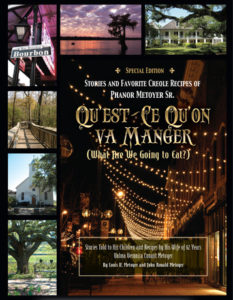
6 thoughts on “Valma Veronica Metoyer”
Thanks so much you are so kind to our Mother.
Dr. Metoyer, You are so very welcome. She is very dear to my heart, and a big, bright light to so many. A precious woman indeed.
No child in the world would ever know the experience the love and the caring of a mother like mine. The one thing that I can always say about my mother is that she put her children before anything else in her life, and their success in life today shows the great job she has done. Love you Mom.
Rodney, she is truly a remarkable woman, and she and your late father raised an amazing family together. Thank you for making the time to share your comment.
Where can we find her culinary cook book?
The link to learn more about Qu’est~Ce Qu’on Va Manger: A Culinary Journey and purchase the book is listed just underneath the interview. You can also get there by clicking on the image of the cookbook cover, just above her recipe. Thank you for reading and for your interest in her book.